- Home
- William Maxwell
So Long, See You Tomorrow
So Long, See You Tomorrow Read online
SO LONG, SEE YOU TOMORROW
William Maxwell
“This calm, reflective and extraordinarily beautiful novel offers American fiction at its finest.” ---Eileen Battersby, Irish Times
“A truly extraordinary novel…Maxwell has tapped a vein of strange, pure emotion.” –Philip Hensher, Mail on Sunday
“He conjures depths of pain and regret in words of radiant simplicity.” –Anthony Quinn, Observer
First published by Alfred Knopf Inc, 1980
For Robert Fitzgerald
I A Pistol Shot
IIThe Period of Mourning
IIIThe New House
IVIn the School Corridor
VThe Emotion of Ownership
VILloyd Wilson’s Story
VII Innocent (More or Less) Creatures
VIIIThe Machinery of Justice
IXThe Graduating Class
_____________________
SO LONG, SEE YOU TOMORROW
I
A PISTOL SHOT
The gravel pit was about a mile east of town, and the size of a small lake, and so deep that boys under sixteen were forbidden by their parents to swim there. I knew it only by hearsay. It had no bottom, people said, and because I was very much interested in the idea that if you dug a hole straight down anywhere and kept on digging it would come out in China. I took this to be a literal statement of fact.
One winter morning shortly before daybreak, three men loading gravel there heard what sounded like a pistol shot. Or, they agreed, it could have been a car backfiring. Within a few seconds it had grown light. No one came to the pit through the field that lay alongside it, and they didn’t see anyone walking on the road. The sound was not a car backfiring; a tenant farmer named Lloyd Wilson had just been shot and killed, and what they heard was the gun that killed him.
At the coroner’s inquest, Wilson’s uncle, who had lived with him for a number of years and was a man in his late sixties, testified that while he was feeding the horses he saw his nephew’s lantern as he passed on his way to the cow barn. The horse barn and the cow barn were about five hundred feet apart. He did not hear the shot and he was not aware that there was anybody on the farm that morning who did not belong there. The household at that time consisted of Wilson, his two little boys, aged six and nine, his elderly housekeeper, and the uncle, Fred Wilson.
The housekeeper then took the stand and testified that on the last morning of his life Lloyd Wilson got up at five-thirty as usual, dressed, and built two fires. While he was waiting for the one in the kitchen range to catch, he stood talking and joking with her. He was in a cheerful mood and left the house whistling. Usually he was through milking and back in the kitchen before she had breakfast ready. At seven o’clock, knowing that he had to go to town and pick up a man he had engaged to do some belated corn shucking for him, she told the younger of the two little boys to go see what was keeping his father so long. He asked for a flashlight, and she peered out into the darkness and then said he didn’t need a flashlight, he could see the lantern shining from the open door of the barn. In a very short while she heard him coming back to the house. He was crying. When she opened the storm door and called out to him, he said, “Papa is dead! He is sitting there with his eyes open but he is dead….”
Who believes in children? Brushing him and his story aside she ran to the barn. Wilson was sitting on a milking stool in the middle stall, his body sunk over against the partition. She caught him by the hand and cried, “Lloyd, what on earth is the matter with you?” –thinking he had been stricken with heart failure or possibly apoplexy. As the child had said, he was sitting there with his eyes open but he was dead.
The housekeeper and Fred Wilson did the necessary things—that is to say, she went back to the house and made a number of telephone calls, and he finished milking the cows and turned them out into the pasture and then sat beside the body until the undertaker and his assistant came and took it back to town. Rigor mortis had set in, and they had to cut the sleeve of his jacket in order to take off his clothes. They removed the jacket, coat, corduroy vest, and flannel shirt, before they saw a small red stain on the undershirt, over the heart.
In those days—I am talking about the early nineteen-twenties—people in Lincoln mostly didn’t lock their doors at night, and if they did it was against the idea of a burglar. One sometimes read in the evening paper that some man had been arrested for disorderly conduct, but that meant drunkenness. Without thinking I would have said that acts of violence could hardly be expected to flourish in a place where houses were not widely separated and never enclosed by a high wall and where it would have been hard to do anything out of the way that somebody by one accident or another or from simple curiosity would not happen to see. But consider the following sentence, from a history of Logan County published in 1911: “While there have been in the neighborhood of about fifty fatal shooting affrays…very few have occurred where the parties were well known or of considerable standing in the community.” As a rule the shooting, or the knifing, or the clubbing, was in a coal miner’s shack or a back alley or a lonely farmhouse, but one of the crimes mentioned in that book took place in a house on Tenth Street, one street over from the house we lived in when I was a child. What distinguished the murder of Lloyd Wilson from all the others was a fact so shocking that the Lincoln Courier-Herald hesitated several days before printing it: The murderer had cut off the dead man’s ear with a razor and carried it away with him. In that pre-Freudian era people did not ask themselves what the ear might be a substitution for, but merely shuddered.
II
THE PERIOD OF MOURNING
I very much doubt that I would have remembered for more than fifty years the murder of f tenant farmer I never laid eyes on if (1) the murderer hadn’t been the father of somebody I knew, and (2) I hadn’t later on done something I was ashamed of afterward. This memoir—if that’s the right name for it—is a roundabout, futile way of making amends.
Before I can go into all that, I have to take up another subject. When my father was getting along in years and the past began to figure more in his conversation, I asked him one day what my mother was like. I knew what she was like as my mother but I thought it was time somebody told me what she was like as a person. To my surprise he said, “That’s water over the dam,” shutting me up but also leaving me in doubt, because of his abrupt tone of voice, whether he didn’t after all this time have any feeling about her much, or did have but didn’t think he ought to. In any case he didn’t feel like talking about her to me.
Very few families escape disasters of one kind or another, but in the years between 1909 and 1919 my mother’s family had more than its share of them. My grandfather, spending the night in a farmhouse, was bitten on the ear by a rat or a ferret and died three months later of blood poisoning. My mother’s only brother was in an automobile accident and lost his right arm. My mother’s younger sister poured kerosene on a grate fire that wouldn’t burn and set fire to her clothing and bore the scars of this all the rest of her life. My older brother, when he was five years old, got his foot caught in a turning carriage wheel.
I was so small when these things happened that either I did not know about them or else I didn’t feel them because they took place at one remove, so to speak. When my brother undressed at night he left his artificial leg leaning against a chair. It was as familiar to me, since we slept in the same room, as his cap or his baseball glove. He was not given to feeling sorry for himself, and older people were always careful not to show their sorrow over what had happened to him. What I felt about his “affliction” was tucked away in my unconscious mind (assuming there is such a thing) where I couldn’t get at it.
; My younger brother was born on New Year’s Day, at the height of the influenza epidemic of 1918. My mother died two days later of double pneumonia. After that, there were no more disasters. The worst that could happen had happened, and the shine went out of everything. Disbelieving, we endured the wreath on the door, and the undertaker coming and going, the influx of food, the overpowering odor of white flowers, and all the rest of it, including the first of a series of housekeepers, who took care of the baby and sat in my mother’s place at mealtime. Looking back I think it more than likely that long before she ever laid eyes on us that sallow-faced, flat-chested woman had got the short end of the stick. She came from a world we knew nothing about, and I don’t remember that she ever had any days off. She may have made a stab at being a mother to my older brother and me, but it would have taken a good deal more than that to break through our resistance. We knew what he had had, and were not to be taken in by any form of counterfeit affection.
My mother’s sisters and my father’s sisters and my grandmother all watched over us. If they hadn’t, I don’t know what would have become of us, in that sad house, where nothing ever changed, where life had come to a standstill. My father was all but undone by my mother’s death. In the evening after supper he walked the floor and I walked with him, with my arm around his waist. I was ten years old. He would walk from the living room into the front hall, then, turning, past the grandfather’s clock and on into the library, and from the library into the living room. Or he would walk from the library into the dining room and then into the living room by another doorway, and back to the front hall. Because he didn’t say anything, I didn’t either. I only tried to sense, as he was about to turn, which room he was going to next so we wouldn’t bump into each other. His eyes were focused on things not in those rooms, and his face was the color of ashes. From conversations that had taken place in front of me I knew he was tormented by the belief that he was responsible for what had happened. If he had only taken this or that precaution… It wasn’t true, any of it. At a time when the epidemic was raging and people were told to avoid crowds, he and my mother got on a crowded train in order to go to Bloomington, thirty miles away, where the hospital facilities were better than in Lincoln. But even if she had had the baby at home, she still would have caught the flu. My older brother or my father or I would have given it to her. We all came down with it.
I had to guess what my older brother was thinking. It was not something he cared to share with me. I studied the look in his hazel eyes and was startled: If I hadn’t known, I would have thought that he’d had his feelings hurt by something he was too proud to talk about. It was the most he could manage in concealment. At night we undressed and got into bed and fell asleep without taking advantage of the dark to unburden our hearts to each other. It strikes me as strange now. It didn’t then. Though we were very different, he knew me inside out-- that is to say, he knew my weaknesses and how to play on them, and this had made me leery about exposing my feelings to him. I also suspect that I had told on him once too often. I have no way of knowing what he might have said. What I didn’t say, across the few feet that separated our two beds, was that I couldn’t understand how it had happened to us. It seemed like a mistake. And mistakes ought to be rectified, only this one couldn’t be. Between the way things used to be and the way they were now was a void that couldn’t be crossed. I had to find an explanation other than the real one, which was that we were no more immune to misfortune than anybody else, and the idea that kept recurring to me, perhaps because of that pacing the floor with my father, was that I had inadvertently walked through a door that I shouldn’t have gone through and couldn’t get back to the place I hadn’t meant to leave. Actually, it was the other way round: I hadn’t gone anywhere and nothing was changed, so far as the roof over our heads was concerned, it was just that she was in the cemetery.
When I got home from school I did what I had always done, which was to read, curled up in the window seat in the library, or lying flat on my back on the floor with my feet in a chair, in the darkest corner I could find. The house was full of places to read that fitted me like a glove, and I read the same books over and over. Children tend to derive comfort and support from the totally familiar—an umbrella stand, a glass ashtray backed with brightly colored cigar bands, the fire tongs, anything. With the help of these and other commonplace objects—with the help also of the two big elm trees that shaded the house from the heat of the sun, and the trumpet vine by the back door, and the white lilac bush by the dining room window, and the comfortable wicker porch furniture and the porch swing that contributed its creak. . . creak . . . to the sounds of the summer night—I got from one day to the next.
My father got from one day to the next by attending faithfully to his job. He was the state agent for a small fire insurance company and traveled from one end of Illinois to the other, inspecting risks and cultivating the friendship of local agents so they would give more business to his company. On Saturday morning, sitting in the library, he would put a check on each inspection slip as he finished glancing over it, and when he had a pile of them he would hand them to me and I would sit on the floor and arrange them around me alphabetically, by towns, proud that I could be of use to him. He left on Tuesday morning , carrying a grip that was heavy with printed forms, and came home Friday afternoon to a household that was seething with problems he was not accustomed to dealing with. His sadness was of the kind that is patient and without hope. He continued to sleep in the bed he and my mother had shared, and tried to act in a way she would have wanted him to, and I suspect that as time passed he was less and less sure what that was. He gave away her jewelry, and more important to me, her clothes, so I could no longer open her closet door and look at them.
I overheard one family friend after another assuring him that there was no cure but time, and though he said, “Yes, I know,” I could tell he didn’t believe them. Once a week he would wind all the clocks in the house, beginning with the grandfather’s clock in the front hall. Their minute and hour hands went round dependably and the light outside corroborated what they said: it was breakfast time, it was late afternoon, it was night, with the darkness pressing against the windowpanes. What the family friends said is true. For some people. For others the hands of the clock can go round till kingdom come and not cure anything. I don’t know by what means my father came to terms with his grief. All I know is that it was more than a year before the color came back into his face and he could smile when somebody said something funny.
When people spoke about my mother it was always in generalities—her wonderful qualities, her gift for making those around her happy, and so on—that didn’t tell me anything I didn’t know before. It was as if they couldn’t see her clearly for what had happened to her. And to us. She didn’t like having her picture taken and all we had was a few snapshots and one formal photograph, taken when she was in her early twenties, with her hair piled on top of her head and a black velvet ribbon around her throat. She was only thirty-eight when she died, but she had grown heavy, as women of that period tended to do. There was no question about the mouth or the soft brown eyes. The rest I did not recognize, though I was willing to believe that she had once looked like that. This picture didn’t satisfy my father either, and he got the photographer who had taken it to touch it up so she would look more like a mature woman. The result was something I was quite sure my mother had never looked like—vague and idealized and as if she might not even remember who we were. My mother sometimes got excited and flew off the handle, but not this woman, who died before her time, leaving a grief-stricken husband and three motherless children. The retouched photograph came between me and the face I remembered, and it got harder and harder to recall my mother as she really was. After I couldn’t remember anymore except in a general way what she looked like, I could still remember the sound of her voice, and I clung to that. I also clung to the idea that if things remained exactly the way they were, if we were careful not t
o take a step in any direction from the place where we were now, we would somehow go back to the way it was before she died. I knew that this was not a rational belief, but the alternative—that when people die they are really gone and I would never see her again—was more than I could manage then or for a long time afterward.
When my father was an old man, he surprised me by remarking that he understood what my mother’s death meant to me but had no idea what to do about it. I think it would have been something if he had just said this. If he didn’t, it was possibly because he thought there was nothing he or anybody else could do. Or he may have thought I would reject any help he tried to give me. As a small child I sometimes had the earache, and I would go to him and ask him to blow cigar smoke in my ear. He would stop talking and draw me toward him and with his lips almost touching my ear breathe warm smoke into it. It was as good a remedy as any, and it was physically intimate. One night—I don’t know how old I was, five or six, maybe—bedtime came and I kissed my mother good night as usual and then went over to my father and as I leaned toward him he said I was too old for that anymore. By the standards of that time and that place I expect I was, but I had wanted to anyway. And how was I to express the feeling I had for him? He didn’t say, then or ever. In that moment my feeling for him changed and became wary and unconfident.
All up and down Ninth Street there were children I could play with, and sometimes I did, but I preferred to play by myself. On the most beautiful spring day of the year I stayed in the house, reading Tik-Tok of Oz. And when I grew tired of reading I shut myself up in a darkened room and played with my postcard projector or with a toy theater I had made out of shirt cardboards. All this worried my father, both from the standpoint of my not being outdoors enough and because if I continued to be interested in such things, how on earth would I support myself when I grew up? There was nothing comical or odd in his thinking this. We are what we are, and he was a businessman, and in his mind there was no better thing that one could be. From time to time his hand came down on some elaborate fancy and I had to pick up the pieces and go somewhere where he wasn’t in order to feel cheerful again. If he spoke impatiently to me or with what seemed to me to be harshness, I could not keep back the tears, which added to his annoyance. As he turned away I had the feeling he had washed his hands of me. Was I not the kind of little boy he wanted to have? He didn’t say that either. It is hard enough for adults to keep their emotional reactions in something like balance. Children simply feel what they feel, and I knew I was not the apple of my father’s eye.

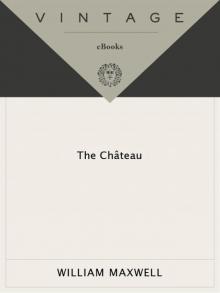 The Chateau
The Chateau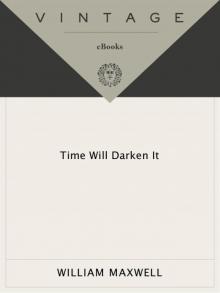 Time Will Darken It Time Will Darken It
Time Will Darken It Time Will Darken It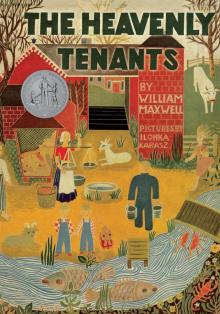 The Heavenly Tenants
The Heavenly Tenants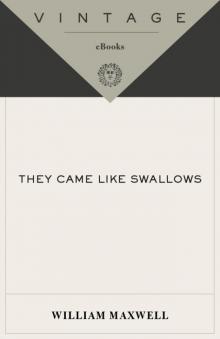 They Came Like Swallows
They Came Like Swallows So Long, See You Tomorrow
So Long, See You Tomorrow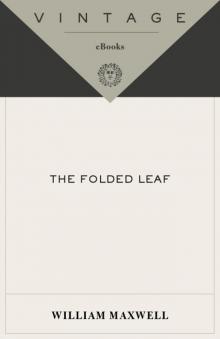 The Folded Leaf
The Folded Leaf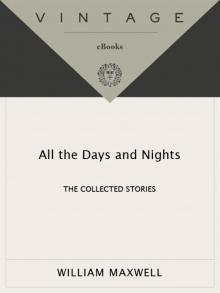 All the Days and Nights
All the Days and Nights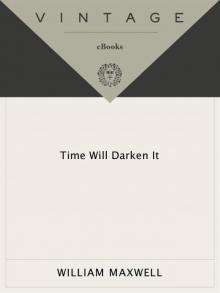 Time Will Darken It
Time Will Darken It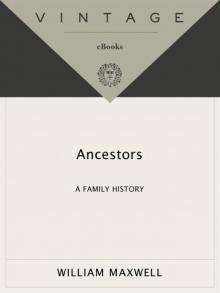 Ancestors
Ancestors